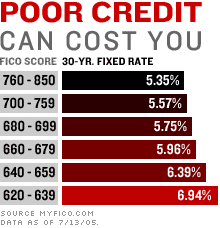|
|
|
|
|
|

| Boost your credit score
|
| Your credit score is not just bank-speak, it's a tool you can control and use to save cash. (Full story)
|
|
|
|
|
|
NEW YORK (CNN/Money) -
Hit by rising gasoline prices, a record percentage of credit-card accounts were delinquent in the second quarter, the American Bankers Association reported Wednesday.
The ABA found that the 4.81 percent of credit-card accounts had payments that were past due by 30 days or more between April and June. That's up from 4.76 percent in the first quarter, which was the previous record. The ABA started tracking delinquencies in 1973.
The ABA also noted an increase in delinquent payments on personal loans, auto loans, home equity loans and lines of credit.
A key reason for the increase: the strain of higher gas prices.
The group noted that the the average cost of filling up the gas tank of a mid-size car in June averaged $38.33, up from $30.63 at the end of last year. Today, the average is higher still, at $47.78.
"The last two quarters have not been pretty. Gas prices are taking huge chunks out of wallets, leaving some individuals with little left to meet their financial obligations," ABA chief economist James Chessen said in a statement.
What about the Katrina effect?
An obvious question, post-Katrina, is what will happen in the next few quarters to delinquency numbers, given that some evacuees, left jobless and homeless, may be relying on credit cards to get through the initial stages of rebuilding their lives.
If there is going to be a Katrina effect, Chessen said in an interview, it may not show up until the fourth quarter, which more fully encompasses the post-hurricane period.
Credit-card companies must report delinquencies to the Federal Reserve, but they have agreed not to report evacuees' delinquent payments to the credit bureaus for an indefinite period of time in order to preserve survivors' credit standing.
What to do if you're in deep
It's one thing to carry a balance on a credit card for awhile. It's another thing if you can't afford to pay your bill on time. The ABA noted five key signs you're overextended financially:
- You can only afford to make minimum payments on your credit card;
- You're always short of cash;
- You're late on important payments, such as rent or the mortgage;
- You take longer and longer to pay off your balances;
- You borrow from one lender to pay another.
The consequences of being delinquent on your credit-card payments are costly and can greatly compound your debt problems.
Late fees, which average $27.46, may be imposed, in addition to sky-high penalty rates, which average just over 24 percent, but can top 30 percent. That penalty rate will remain on your account for as long as the creditor chooses.
And because of "universal default" policies, being delinquent on one card can trigger penalty rates on others, even if your payments are current on them.
(See other ways you may get slammed with credit card costs.)
Lastly, your credit score will take a hit when the delinquency is reported to the credit bureaus. And that means you will get higher interest rates on any loans you may seek.
There are some initial steps you can take to tackle your debt. First, try to pay at least the minimum owed on time every month; avoid using your credit cards until you've gotten a handle on your debt; and contact creditors to let them know your situation. They may be willing to negotiate a deal, or at least give you an extension to meet your obligation.
For more help on managing your debt load, see Money 101: Controlling debt, and read Debt overload: 5 red flags.

|